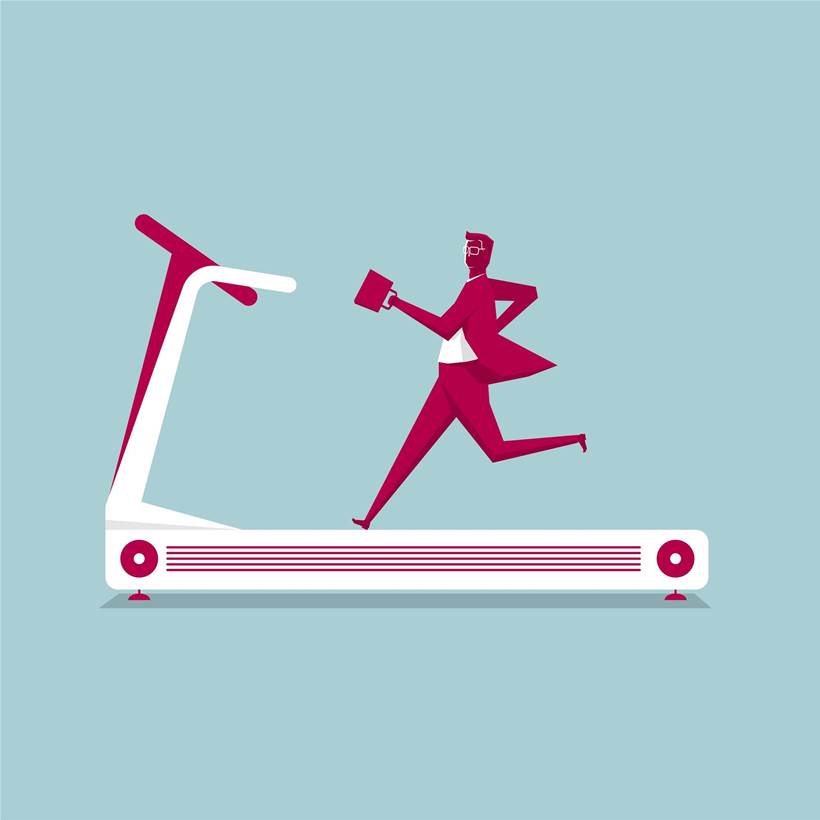Cancer specialist and author Dr David Agus is a firm believer that everyone is in charge of their healthcare - and that technology can play a part in that.
He's particularly excited by heart rate variability monitoring - a feature baked into the new Apple Watch, similar Android Wear devices and countless fitness bands.
"Heart rate variability is the coolest freaking thing in the world," Dr Agus told the Association and Communication Events' Connect 2015 conference in Melbourne.
"I first saw this when I went to the Olympic training camp."
Dr Agus believes heart rate variability can act as a traffic light system to help people recognise and manage the onset of stress.
"It turns out if you're relaxed your heart rate is exactly even - bang, bang, bang," he explains.
"If you're a little bit stressed it's off by a couple of milliseconds, and if you're very stressed it's off by close to 10 milliseconds."
"If you think about it it's green, yellow and red [signals] ... once you're in yellow you can relax and go back to green, but once you're in red it's impossible to go back.
"You start to learn the cues - when my shoulders are up I'm in yellow, I've got to go back down to green. It's an amazing thing when you start to learn yourself and about yourself and take control of your own healthcare."
One of Dr Agus' key points is that any decision you make with respect to your health should be made with the benefit of data.
His concern is that some present directions in health are unsupported by data from large scale studies (he uses the example of vitamin D supplements, which he argues offer no proven health benefits).
Using data to support healthcare directions, of course, applies to the entire health community, not just individuals.
In that way, Dr Agus wants doctors "to be more like climate modellers than biologists going forward".
"It's the notion that we could start to build models to understand and predict what to do based on data," he said.
Things to change now
Dr Agus said he had the privilege of caring for Steve Jobs during his final six years.
"We spoke almost every day," he said.
He would also go and see Jobs once a week and they would go for a walk.
"[Jobs] said, 'Agus, there are two reasons to go for a walk. One is the health benefits because they're real' - and thats right - [but] he said, 'The other is, if you go walk [with] somebody and you know where you're going and they don't, it gives you a business advantage.
"'So if you know you're going to turn right at the corner and they don't, it gives you that upper hand'. And he took every little percentage he could get."
Dr Agus' views on the sedentary ways many employees work - including those in computing-related fields - are well known. (Effectively, that sitting for extended periods is as bad as smoking).
Yet, it wasn't until he used one of the first breed of fitness wearables - a Nike Fuelband - that he made some work-related changes.
"I was shocked how much I sat during the day," he said.
He bought a treadmill desk and uses it "at a very slow pace" to email people for about two hours a day.
"I also got a headset so I can walk around the office when I go on conference calls, and at least one meeting a day I go for a walk," he said.
He said workers might currently exercise at a gym, but they did not do enough to offset the long-term health effects of extended periods of being seated.
"There's actual data that just adding minutes of movement a day adds years of life," he said.
"It's pretty powerful that if we want to do a simple thing it's encourage movement."
Another simple way to improve your performance is to eat regularly.
"If you have your meals the same time every day you're going to improve your health," he said, adding that people that grazed "whenever they were hungry" had an 81 percent higher incidence of diabetes than those who did not.
This means laying off any company-provided snacks if you want to get more out of your day.
"The greater the company is, the more snacks they put out during the day," Dr Agus said. "In fact, they decrease performance by doing that."
He also said that irregular meals - such as taking lunch at midday one day then 2pm the following day - had side effects that could take up to two days to wear off.
Ry Crozier travelled to Connect 2015 as a guest of Nuage Networks.










